Related Research Articles

St. Albert is a city in Alberta, Canada, next to the Sturgeon River, northwest of the City of Edmonton, the provincial capital. It was originally settled as a Métis community, and is now the second-largest city in the Edmonton Metropolitan Region. St. Albert first received its town status in 1904 and was reached by the Canadian Northern Railway in 1906. Originally separated from Edmonton by several miles of farmland, the 1980s expansion of Edmonton's city limits placed St. Albert immediately adjacent to the larger city on St. Albert's southern and eastern sides.
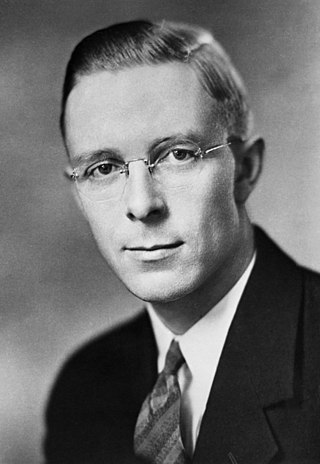
The 1967 Alberta general election was held on May 23, 1967, to elect members of the Legislative Assembly of Alberta to the 16th Alberta Legislature. The election was called after the 15th Alberta Legislature was prorogued on April 11, 1967, and dissolved on April 14, 1967.
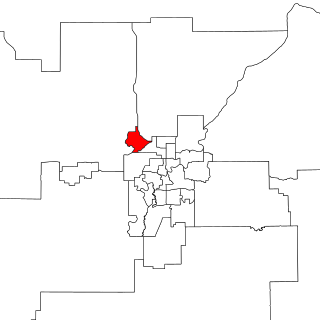
St. Albert is a provincial electoral district in Alberta, Canada. The district is one of 87 current districts mandated to return a single member to the Legislative Assembly of Alberta.
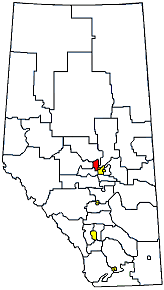
Spruce Grove-Sturgeon-St. Albert was a provincial electoral district in Alberta, Canada mandated to return a single member to the Legislative Assembly of Alberta using the first-past-the-post method of voting from 1993 to 2012.

Stony Plain was a provincial electoral district in Alberta, Canada, between 1905 and 2019. The district returned a single member to the Legislative Assembly of Alberta throughout its history, using the first past the post method of voting for most of its existence but single transferable vote from 1926 to 1957. The district was created in 1905 when Alberta became a province. The riding in its original boundaries stretched from the west Edmonton city limits to the British Columbia border, but over time it was significantly reduced in size.

Highway 28 is a 293-kilometre (182 mi) highway in north-central Alberta, Canada that connects Edmonton to Cold Lake. It begins at Yellowhead Trail in Edmonton as 97 Street NW, running through the city's north suburbs before entering Sturgeon County and passing CFB Edmonton. After merging with Highway 28A near Gibbons it winds through agricultural lands of north-central Alberta, roughly paralleling the North Saskatchewan River until Smoky Lake before continuing east through St. Paul County to Bonnyville. It turns northeast to CFB Cold Lake, before ending at Lakeshore Drive in the city of Cold Lake shortly thereafter.
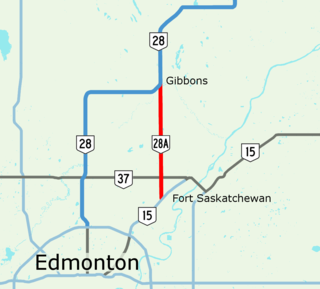
Alberta Provincial Highway No. 28A, commonly referred to as Highway 28A, is an 18-kilometre (11 mi) highway in Alberta, Canada that connects Highway 15 in northeast Edmonton to Highway 28 near Gibbons. It is numbered 17 Street NE within Edmonton and forms an alternate route to Highway 28 into the city from the north. As the southernmost component of the Edmonton–Fort McMurray corridor, the highway is designated as a core route of Canada's National Highway System for its entire length.
Paul Chalifoux is a politician and the former mayor of St. Albert, Alberta. He served two terms as mayor, first one having taken place from 1998 to 2001 and the second from 2004 to 2007.
Ray M. Gibbon is a former mayor of St. Albert, Alberta, having served in this capacity from 1968 to 1974, and briefly again in 1989.
Leonard Clarence Bracko was a Canadian politician. He was a city councillor for St. Albert City Council and a member of the Legislative Assembly of Alberta.
Robert A. "Bob" Russell was a Canadian politician from Alberta. He served as the President of the Alberta Liberal Party, and a municipal councillor in St. Albert, Alberta.
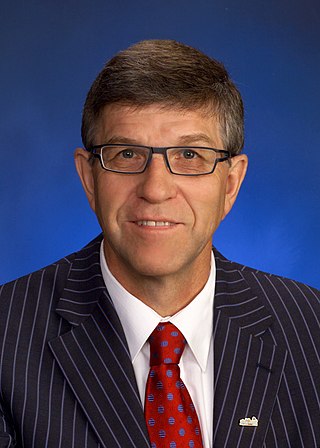
Nolan Crouse is the former Mayor of St. Albert, Alberta, Canada and a former candidate for the leadership of the Alberta Liberal Party.
George Kenneth (Ken) Allred is a politician in Alberta, Canada, who was a member of the Legislative Assembly of Alberta, in which he sat as a member of the Progressive Conservative caucus. He is also a former municipal councillor in St. Albert, Alberta and former candidate for the House of Commons of Canada.
Harry Keith Everitt was a Canadian politician who was a member of the Legislative Assembly of Alberta and county councillor in Sturgeon County, Alberta.
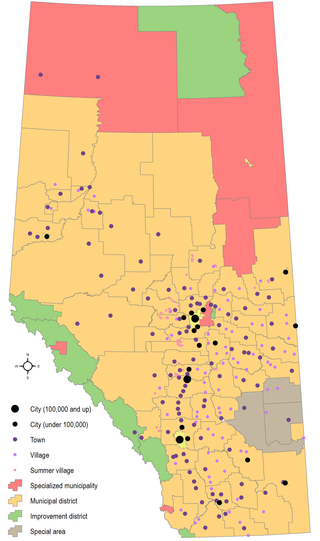
Municipal elections were held in Alberta, Canada on Monday, October 15, 2007. Since 1968, provincial legislation has required every municipality to hold triennial elections. Mayors (reeves), councillors (aldermen), and trustees were elected to office in 15 of the 16 cities, all 111 towns, all 99 villages, all 4 specialized municipalities, all 64 municipal districts, 3 of the 7 improvement districts, and the advisory councils of the 3 special areas. The City of Lloydminster is on the Saskatchewan schedule, and held elections on October 25, 2006 and October 28, 2009, while 4 improvement districts have no councils and are led solely by the Minister of Municipal Affairs. Since the 2004 municipal elections, the Town of Lac La Biche and Lakeland County amalgamated to form Lac La Biche County, the villages of Irricana and Onoway became towns, the Town of Brooks became a city, and the Village of Sangudo was dissolved.
The City of Edmonton has experienced a series of municipal boundary adjustments over its history since originally incorporating as a town in 1892 through incorporation as a city, amalgamation or annexation of other urban municipalities, annexation of rural lands from its surrounding neighbours, and separation of lands back to its rural neighbours. Its most recent annexations, which came into effect on January 1, 2019, involved acquisition of lands from predominantly Leduc County as well as Beaumont and Sturgeon County.
Redwater was a provincial electoral district in Alberta mandated to return a single member to the Legislative Assembly of Alberta from 1940 to 1971 and again from 1993 to 2004.
Ray Gibbon Drive, referred to as the West Regional Road during proposal and planning stages, is a major arterial road in St. Albert, Alberta. With the exception of the Edmonton portion of 184 Street, it is only partially constructed as a two-lane road. Currently, it is 8.2 kilometres (5.1 mi) long and runs between Anthony Henday Drive and Villeneuve Road. It was named at the official opening of Stage One in October 2007, after former mayor of St. Albert Ray Gibbon, who served from 1968 to 1974 and again in 1989. Gibbon died in 1999, but his wife and family were present for the official opening, riding in the vintage lead vehicle for the first use of the road.

Morinville-St. Albert is a provincial electoral district in Alberta, Canada. The district is one of the 87 districts mandated to return a single member (MLA) to the Legislative Assembly of Alberta using the first past the post method of voting. It was contested for the first time in the 2019 Alberta election.
On October 18, 2021, a referendum was held in Alberta, Canada on two questions, whether equalization payments should be eliminated from the Constitution of Canada, and whether the province should observe daylight saving time year-round. The referendum was held as part of the 2021 Alberta municipal elections and the Senate nominee election.
References
- ↑ "Canada.Com | Homepage | Canada.Com".
- 1 2 "Archived copy". Archived from the original on 2007-09-27. Retrieved 2007-03-04.
{{cite web}}: CS1 maint: archived copy as title (link) - ↑ "Archived copy" (PDF). Archived from the original (PDF) on 2004-07-22. Retrieved 2007-03-06.
{{cite web}}: CS1 maint: archived copy as title (link) - ↑ Alberta Teachers' Association - In the News - Majority oppose Bill 11
- ↑ "Critics wary of health care recommendations – ExpressNews – University of Alberta". Archived from the original on 2006-04-27. Retrieved 2007-03-06.
- ↑ canada.com | Article
- ↑ Edmonton Journal, 17 October 1974
- ↑ Edmonton Journal, 20 October 1977
- ↑ St. Albert Gazette (1999). St. Albert 1861-1999: Our Story, St. Albert: Gazette Press Ltd.
- ↑ "Archived copy". Archived from the original on 2007-09-27. Retrieved 2007-03-06.
{{cite web}}: CS1 maint: archived copy as title (link) - ↑ Richard H. M. Plain (Phd Econ)
- ↑ St. Albert Historical Society (1985). The Black Robe's Vision, St. Albert: St. Albert Historical Society.